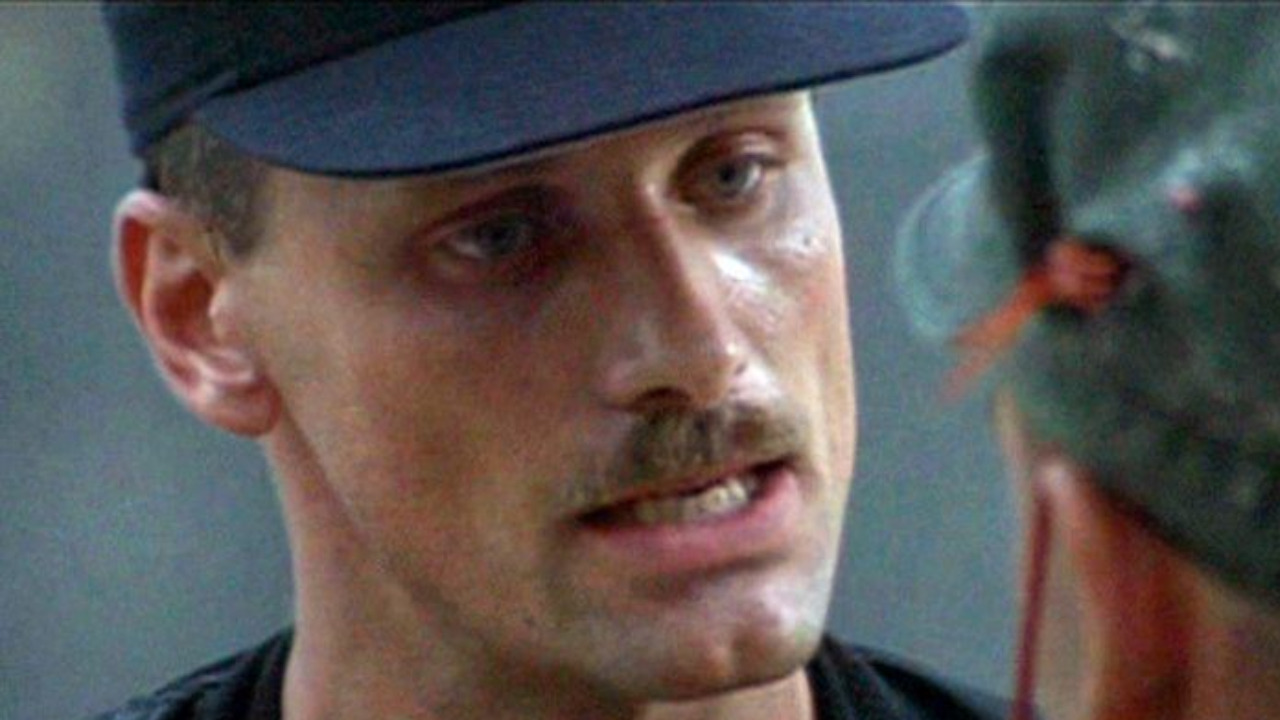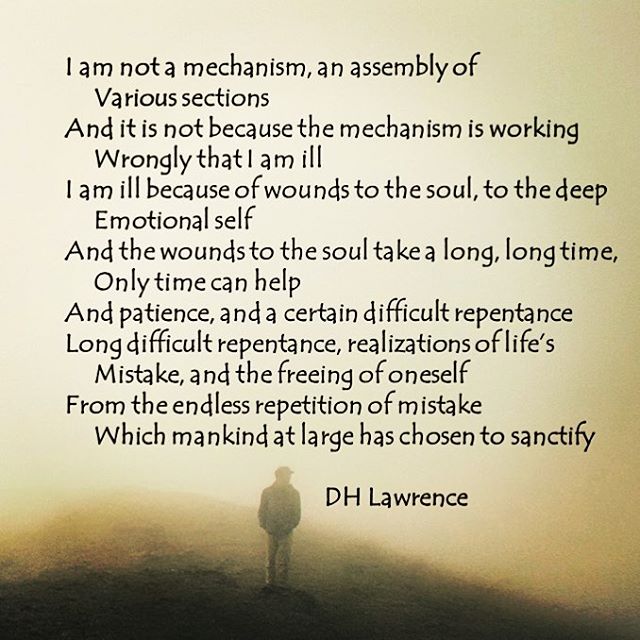Years ago (1997), the movie GI Jane came to theatres, with Demi Moore in the starring role beginning her journey to become a U.S. Navy SEAL. The movie ends with the character, Navy SEAL Master Chief John Urgayle reciting D.H. Lawrence’s poem titled, “Self-Pity”. This poetry scene has always stayed with me even though the movie wasn’t particularly good.
I never saw a wild thing
sorry for itself.
A small bird will drop frozen dead from a bough
without ever having felt sorry for itself.
Director Ridley Scott wanted “somebody fresh and new” for the role of Master Chief John Urgayle. In that quest, Scott finished his search by casting actor Viggo Mortensen as the hard-driving Master Chief. Scott wanted someone who stood out and yet had a certain quietness to him. The director felt that Mortensen’s modesty was a perfect fit for playing a SEAL in the movie. Mortensen went to the naval base in Coronado, California to observe the training practices of as many active and retired Navy SEALs as he could. Mortensen was excellent in the movies, A History of Violence, and The Lord of the Rings: The Fellowship of the Ring.
One of the scenes in the movie has the Master Chief addressing a platoon of prospective SEALs. Most military movies with this kind of defining scene has an actor recite a cliché laden speech. Scott wanted something different. This is important because this is where the audience is introduced to the protagonist’s foil for the first time. To be a Navy SEAL the Master Chief must be impressive as a foil; he must illuminate, contrast, and conflict with the protagonist in order to highlight the particular qualities of GI Jane. We must either like or hate the Master Chief in order to sympathize with the journey GI Jane is taking. It was here that the actor Mortensen suggested injecting a short poem by D. H. Lawrence titled, “I never saw a wild thing sorry for itself…” into the movie.
This was an interesting decision on Scott’s part to allow Mortensen to do this because it allowed the audience to see the rich depths of Urgayle’s character. We now know Urgayle is a sensitive man while simultaneously being a person who was capable of violence. D.H. Lawrence, known for his feelings of conflict and anxiety, his desire to express what he felt about the natural, phenomenal world, and his comprehensive effort to partake of community while at the same time feeling like an exasperated outsider was an interesting addition to Mortensen’s role. The choice of poem fleshed out the character of the rule-making and rule-following Master Chief.
Using the poem written by Lawrence made Master Chief Urgayle an intriguing character rather than a paper-thin person without any depth. This is because Lawrence was an outsider who did not fit into the constructs of normal society. He felt that society had far too many lies to tell, and Lawrence longed to feel love and ecstacy in a world where he also percieved contradictions. In his story Women in Love (1920), Lawrence writes, “But better die than live mechanically a life that is a repetition of repetitions.” Yet, the military world is full of repititions. Lawrence did not want to live life cheaply rather he wanted to live it richly and fully. Many warriors share much in common with phenomenological writers like Lawrence, George Eliot, Thomas Hardy or E.M. Forster. These are men who need conflict while they are also paradoxically seeking a unity of the soul through their experience with the exterior and interior world.
Lawrence wrote, in Apocalypse (1930):
“What man most passionately wants is his living wholeness and his living unison, not his own isolate salvation of his “soul.” Man wants his physical fulfillment first and foremost, since now, once and once only, he is in the flesh and potent. For man, the vast marvel is to be alive. For man, as for flower and beast and bird, the supreme triumph is to be most vividly, most perfectly alive. Whatever the unborn and the dead may know, they cannot know the beauty, the marvel of being alive in the flesh. The dead may look after the afterwards. But the magnificent here and now of life in the flesh is ours, and ours alone, and ours only for a time. We ought to dance with rapture that we should be alive and in the flesh, and part of the living, incarnate cosmos. I am part of the sun as my eye is part of me. That I am part of the earth my feet know perfectly, and my blood is part of the sea. My soul knows that I am part of the human race, my soul is an organic part of the great human soul, as my spirit is part of my nation. In my own very self, I am part of my family. There is nothing of me that is alone and absolute except my mind, and we shall find that the mind has no existence by itself, it is only the glitter of the sun on the surface of the waters.”
If then, we are to take Urgayle for the man we think he is, he truly is a compassionate man. He is a thoughtful man, and he is a willful man. He has become a Master Chief; someone who disciplined his body enough to become elite in the Navy warrior ranks, while at the same moment being a dreamer. Lawrence while alive was greatly ill. He suffered from tuberculosis. And when he was close to death he decided to die at a place that was of his choosing and not in a place that held him captive. He chose to live and die on his terms and so he passed in France in 1930.
But D.H. Lawrence wasn’t always admired. He riled many with his writings. He critiqued Western religion, wanted structure but disliked fascism, and was said to be a misogynistic and sexist writer. What can this tell us about Urgayle? I do not imply that he shares all of the same qualities and values as Lawrence. Urgayle is simply a complex man. Director Scott wanted us to admire him and we do. Another example of the complexity of the Master Chief’s character can be found in a scene where Mortensen is reading a novel by J.M. Coetzee. Coetzee is a dissident South African who is not on the Navy’s recommended reading list. Love it or like it, these additions create a character that is more real and less false. We know men like this.
The poem that Urgayle reads becomes an important part of the film. Sorry to disappoint but my article isn’t to discuss the merits of women in Special Operations roles or whether they are capable of doing so. Rather, I want to write about transformation and maturity that should never end in the heart of a human being.
The closing scene of the movie is important to framing the whole story of their collision, similarities, differences and then separate and also parallel journeys. Urgayle gives the gift of the book, with the poem inside of it, to signal to Moore’s character that he is apologizing to her for the abuse she suffered under his hands. He respects her. Certainly she has transformed from recruit to SEAL in the movie, but Urgayle has transformed too. His two varied, readings of the poem mark his growth as a man. Urgayle reads the poem in an obnoxious, direct manner to the platoon during the middle of the movie and he also reads it at the end of the movie in a softer, and more reflective way. The ending of the movie, juxtaposes singer Chrissy Hynde’s melodious voice with Mortensen’s re-reading of the poem, and the effect is strong. The Master Chief has grown. His purview has shifted. He did not have to leave her a dog-eared copy of the book but he does. In some sense he is passing the mantle to her. She may one day use the same book if she rises in this fictitious world of GI Jane to one day inspire those under her watch.
What was the director trying to say about transformation in this movie? Anyone who served in the military can understand culture shock, transformation and a rejection of the old life in order to succumb to the new one. How odd then, that to survive in the world of warfare, arms and men, a ‘warrior’ must become like an animal in that animals do not feel sorry for themselves. A philosophic comparison and contrast of man to beast means a human must put brackets around his feelings and reduce his emotions so that he never feels self-pity.
How do we know this? The director’s camerawork is the clue. The camera focuses on the poem. It is encircled in red and the word Self-Pity is underlined. Urgayle’s marking of the poem with ballpoint pen suggests that he is a pensive person and has read and thought about the poem many, many times. Actor Mortensen is quoted as saying he actually gave actress Moore the dog-eared copy of his own book for use in the film.
Humans have the greatest ability to pity themselves. No animal can do this. Animals live in each moment without any philosophic forethought or reflection on the past. A man can starve and feel sorry that he hungers. A bird can starve and yet continues to exist without pitying its circumstance. The human soul aspires to be something less human, less weakly, and more godly. Yet, being weakly can paradoxically set us free (if but for a moment). Humility is the gateway for transformation into something that is noble, and worthy.
The symbol of the bird varies in each culture, yet the bird is generally thought to symbolize freedom. In Maori culture birds are the symbol of strength and valor. Many cultures believe that they symbolize eternal life; the link between heaven and earth. The ancient Egyptians believed that the bird symbol represented the power of the soul leaving a person’s body.
What do we think about or feel when an animal dies? What do we think about or feel when a man dies? How should we approach their death? How should we approach our own death? What lesson can we learn about our own finiteness?
An animal cannot ask these questions and yet, a bird dies “nobly” without ever having felt “sorry for itself”.
*The views and opinions expressed on this website are solely those of the original authors and contributors. These views and opinions do not necessarily represent those of Spotter Up Magazine, the administrative staff, and/or any/all contributors to this site.


